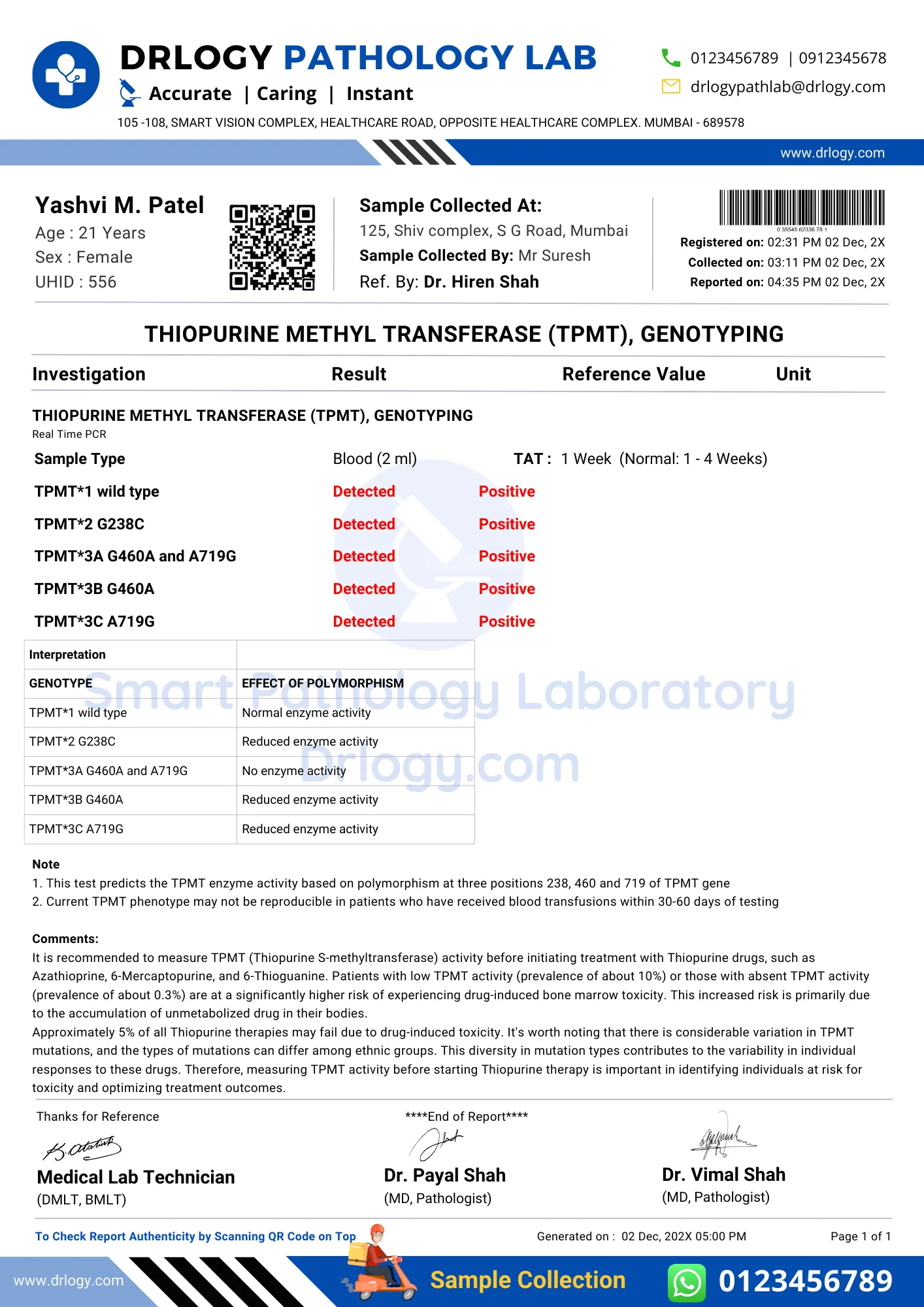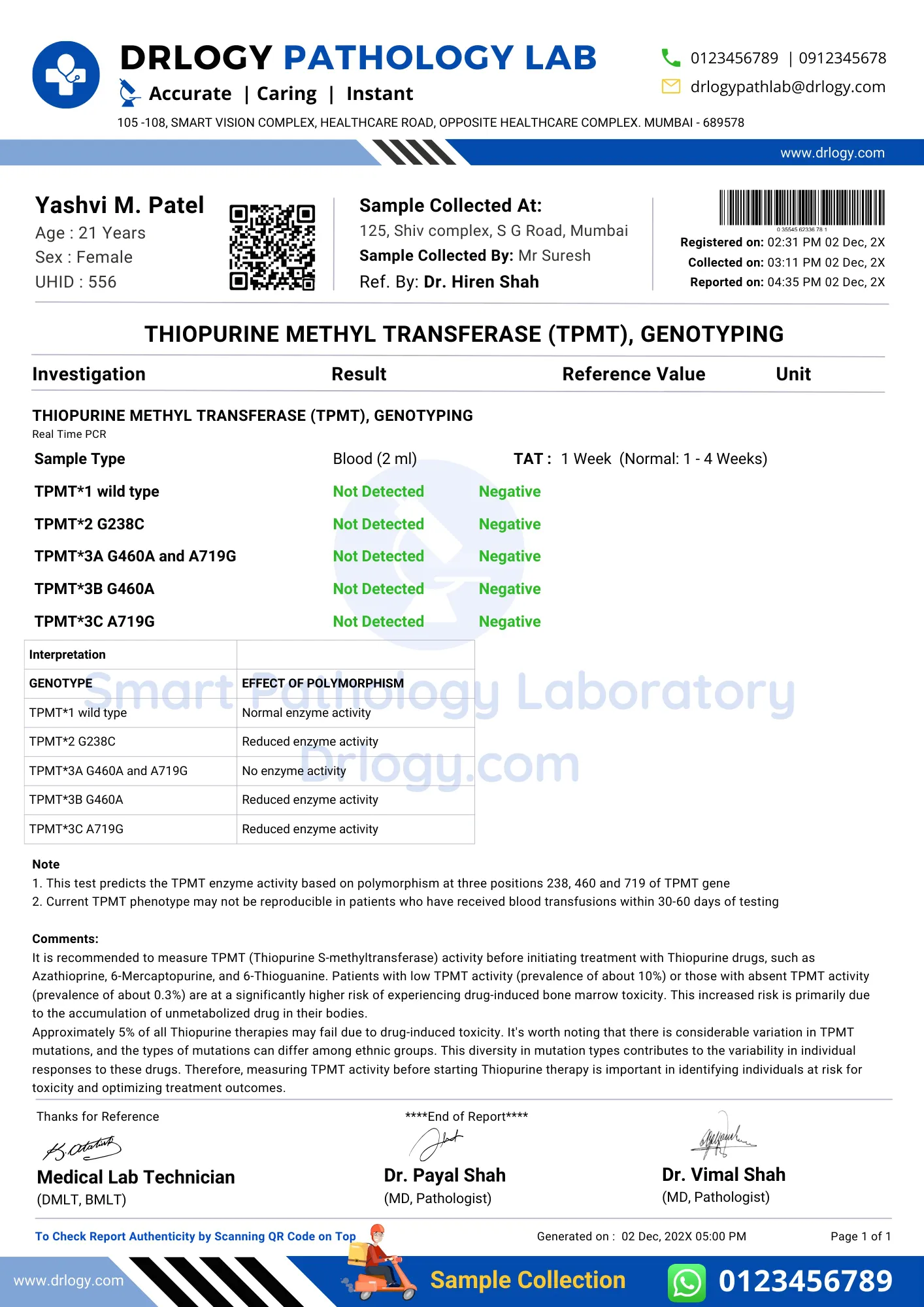
Thiopurine methyltransferase (TPMT) Test For Crohn's Disease or Leukemia
The Thiopurine Methyltransferase (TPMT) Test checks an individual's genetic makeup to determine how their body metabolizes certain medications, particularly thiopurine drugs used for conditions like Crohn's disease or leukemia. It helps doctors prescribe the right drug doses to avoid side effects and ensure effective treatment.
TPMT Test
Here are the basic details of the TPMT Test.
| Also Known As | Thiopurine Methyltransferase |
| Type | Genetic Test |
| Purpose | Medication Safety |
| Sample Type | Blood |
| Preparation | None |
| Fasting | Not Required |
| Gender | Any |
| Age Group | Any |
| Normal Value | 24.0 - 44.0 U/mL |
| Reporting Time | Within 24 hrs |
| Cost | 2600-5200 INR* |
*TPMT Test Price range may vary as per location, lab type, and lab test procedure.
TPMT Test Means
The thiopurine methyltransferase (TPMT) Test is an enzyme that plays a crucial in metabolizing certain medications, like thiopurines.
- The TPMT test is performed to determine a patient's TPMT enzyme activity.
- It helps to personalize dosages of thiopurine medications, reducing the risk of adverse reactions.
- Variations in TPMT activity can lead to drug toxicity or treatment failure.
- The test is particularly significant for patients with inflammatory bowel disease.
- Individuals with low TPMT activity may require lower doses of thiopurine drugs.
TPMT Test Purpose
The purpose of the TPMT Test is to:
- To personalize dosages of thiopurine medications like azathioprine and mercaptopurine.
- Identify individuals with low TPMT activity to prevent drug toxicity.
- Optimize treatment for inflammatory bowel disease (IBD) patients.
- Reduce the risk of adverse reactions and treatment failure.
- Ensure the safety and efficacy of thiopurine drug therapy.
- Minimize side effects and complications in TPMT variant carriers.

TPMT Test Preparation
Here is the basic preparation for the TPMT Test.
Before Test
- No specific dietary or fasting requirements.
- Inform your healthcare provider about any medications you are taking.
- Discuss any known allergies with your healthcare provider.
During Test
- A blood sample is usually collected for this test.
After Test
- Resume regular activities.
- Wait for the results to be communicated to you by your healthcare provider.
TPMT Test Procedure
Here is the basic TPMT Test Procedure.
- Your healthcare provider will collect a blood sample from a vein in your arm.
- The blood sample will be sent to a laboratory for analysis.
- The laboratory will determine your TPMT enzyme activity.
- Results are usually available within a few days.
- Your healthcare provider will discuss the results with you, especially if you're taking medications affected by TPMT levels.
- Adjust medication doses, if needed, based on the test results.
TPMT Test Result
Here is the basic reading of TPMT Test results.
- Normal TPMT Activity: Indicates typical enzyme function, allowing for standard doses of certain medications.
- Low TPMT Activity: Suggests reduced enzyme function, requiring lower doses of TPMT-metabolized drugs.
- High TPMT Activity: Uncommon, but may necessitate higher medication doses for effective treatment.
- Individualized Medication Adjustment: Results guide medication dosages for safety and efficacy.
TPMT Test Positive Result Report

TPMT Test Positive Report
TPMT Test Negative Result Report

TPMT Test Negative Report
TPMT Test Normal Range
Here is the normal range of the TPMT Test
| TPMT Activity | Interpretation |
|---|---|
| 24.0 - 44.0 U/mL |
|
TPMT Test Interpretation
Here is the Interpretation of the TPMT Test.
| TPMT Activity | Interpretation |
|---|---|
| Below 24.0 U/mL |
|
| 24.0 - 44.0 U/mL |
|
| Above 44.0 U/mL |
|
TPMT Test High Levels
Here are the potential causes of high TPMT Test levels:
| Potential Causes | Explanation |
|---|---|
| Genetic variation | Some individuals have naturally higher TPMT activity due to genetic factors. |
| Enhanced drug metabolism | Increased enzymatic activity can lead to faster thiopurine drug breakdown. |
| Medications | Certain medications may induce TPMT activity, increasing drug metabolism. |
| Enzyme inducers | Exposures to substances that induce enzyme activity. |
| Physiological factors | Factors like age and pregnancy can influence TPMT activity. |
TPMT Test Low Levels
Here are the potential causes of low TPMT Test levels:
| Potential Causes | Explanation |
|---|---|
| Genetic variation | Genetic mutations can result in low or absent TPMT activity. |
| Medications | Some medications inhibit TPMT activity, reducing drug metabolism. |
| Inhibition by substances | Certain substances can inhibit TPMT enzyme activity. |
| Autoimmune disorders | Autoimmune conditions may affect TPMT function. |
| Physiological factors | Factors like age, liver disease, and kidney disease can influence TPMT activity. |
Specimen Requirements For TPMT Test
Here are the specimen requirements for the TPMT Test.
| Specimen | Whole blood | |
| Volume | 8 mL adults; 5 mL pediatric | |
| Container | Green-top (sodium heparin) tube or lavender-top (EDTA) tube | |
| Collection | Separate serum from cells within one hour of collection. Transfer to a plastic transport tube before shipping. | |
| Storage | Refrigerate. | |
| Sample Stability | Temperature | Period |
| Refrigerated | 14 days | |
| Frozen | Unstable | |
| Freeze/thaw cycles | Unstable | |
| Causes for Rejection | Frozen specimen; gross hemolysis; clotted specimen. | |
TPMT Test is Safe?
The TPMT test is safe and non-invasive.
- It only requires a blood sample, which is a routine procedure with minimal risk.
- The test helps ensure the safe and effective use of certain medications.
When Do You Get TPMT Test Results?
- TPMT test results are usually available Within 24 hrs.
- Your healthcare provider will discuss the results and any necessary medication adjustments during a follow-up visit.
TPMT Test Limitation
Here is the basic limitation of the TPMT Test.
- TPMT testing does not predict all possible adverse reactions to thiopurine drugs.
- Variability in TPMT enzyme levels can lead to inconsistent test results.
- Other genetic and environmental factors can also influence drug metabolism.
- Test results may not provide guidance for optimal drug dosages.
- The test may not account for rare genetic variants affecting drug metabolism.
TPMT Test Risk Factors
Here are some of the risk factors of the TPMT Test.
- Undergoing treatment with thiopurine medications, such as azathioprine or mercaptopurine.
- A family history of adverse reactions to thiopurines or known TPMT enzyme deficiencies.
- Certain ethnic backgrounds may have a higher prevalence of TPMT deficiency.
- Co-existing medical conditions that may affect drug metabolism.
- Concomitant use of medications that interact with thiopurines.
Doctor Recommendations After TPMT Test Result
Here are the Doctor's recommendations or consult a specialist after the TPMT Test.
| TPMT Level | Doctor to Visit | Reason to Go to Doctor |
|---|---|---|
| High | Gastroenterologist | Evaluate thiopurine medication dosage. |
| Normal | No specific specialist | Routine TPMT screening, no concerns. |
| Low | Gastroenterologist | Adjust thiopurine medication dose. |
TPMT Test Price
Here are the estimated TPMT Test Prices in India with different top cities:
| City | Price Range (INR)* |
| 2600-5200 | |
| 2800-5200 | |
| 2600-5200 | |
| 2800-5200 | |
| 2600-5200 | |
| 2800-5200 | |
| 2600-5200 | |
| 2800-5200 | |
| 2800-5200 | |
| 2600-5200 | |
| 2800-5200 | |
| 2600-5200 | |
| 2800-5200 | |
| 2600-5200 |
*TPMT Test Price are approximate and vary depending on a specific laboratory or healthcare facility.
Summary
Overall, TPMT Test is is vital before starting thiopurine medications to prevent potentially life-threatening adverse reactions, helping personalize treatment plans. Also check Drlogy Test for detailed information about all medical tests for patients, doctors, scholers and medical students.
Reference
- Thiopurine Methyltransferase - Wikipedia [1].
- Thiopurine S-methyltransferase testing for averting drug toxicity in patients receiving thiopurines: a systematic review - NIH [2].




